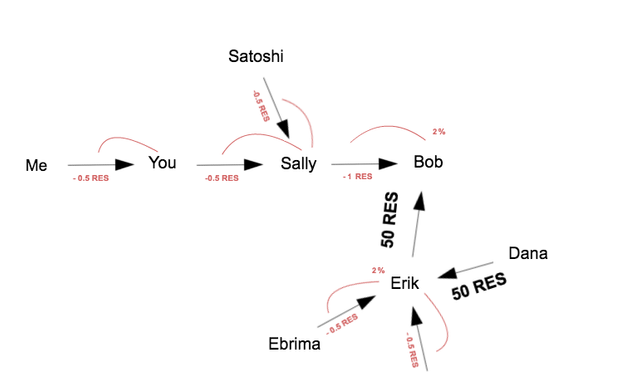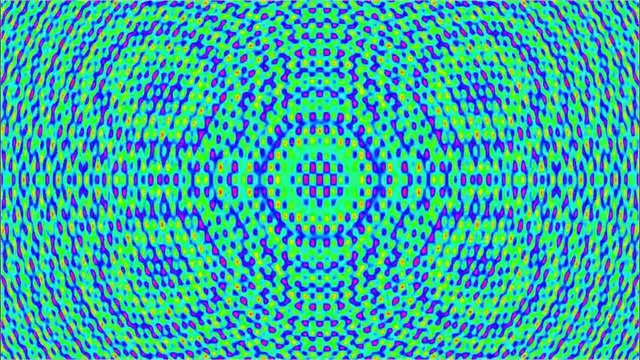I've been looking for weeks for a way to do the swarm redistribution as a "pulse", thinking "is it possible to get it to behave like a fluid" (on a computation-level), and with the symmetric design, it is, it does. Exactly what I needed and what I was looking for, and I even discovered it a year ago, without fully integrating the idea.

One property that I wanted, was that the swarm redistribution "pulse" could aggregate along its path, and that many "pulses" could combine into one (similar to a fluid, like blood in a vascular system), and with person-to-person swarm redistribution, many pulses could converge onto one person, and their peers (who have credit lines to them) could wait to propagate the pulse until the amount reaches some threshold, all depending on what their preferences are.
Bryan Curtin likened the symmetric design to electrons in a wave, each person propagating the wave to the next person, fully symmetric (very fast, easy to compute. )

With person-to-person swarm redistribution, "pulses" decrease with distance, but they also converge with other pulses, also a function of distance, while the net-balance change is the same across the pulse, zero, except for the last person, who gets a surplus.
That "pulses" converge could counter-act the decrease with distance in some ways, and the reason they converge is since they "spread out", from one person towards many, and are therefore a bit similar to ripples on water.

With person-to-person swarm redistribution, the more evenly trust lines are distributed in the network, the more evenly each person receives swarm redistribution, so it is up to people to organize their trust in a way where everyone is covered.
In Resilience, the primary way people can continue to issue IOUs (have credit), and by doing so continue to pay for swarm redistribution, is through clearing credit using the path-finding mechanism Ripple. Decay of IOUs through swarm redistribution is secondary and those who clear credit will have more credit in the network, since they free up their trust lines to those who give them credit.
Compute
Is swarm redistribution computation heavy? It is in the way that path-finding in Ripple is computation heavy, or payment-routing in Ripple. The benefit of using payment-routing and path-finding is that it decentralizes control of the currency, and benefits of swarm redistribution could be similar.
In contrast to demurrage, swarm redistribution does not need timestamps, or consensus on time, only person-to-person consensus on sequence of events, freeing up the need to compute global consensus on time, which requires resources as well.
Tax on every hop during payment routing?
In Resilience, you "tax" trust, person-to-person, to provide some amount of "unconditional trust" within a network-of-trust, which provides a medium similar to universal basic income, all entirely person-to-person (unenclosable carrier. ) It's an accounting-based value redistribution system.
To see how it is "tax" on trust, at 100% swarm redistribution the system becomes a gift economy, as in, operating only on unconditional trust in other people, then as it approaches 0%, more and more person-to-person trust, until it is just mutual currency + Ripple at 0% (I used to say in 2012 that the system "scales from capitalism to a gift economy". )
Ripple uses payment routing so that people are able to trade with untrusted parties by exchanging IOUs only with trusted parties. During payment routing, hopping along multiple trusted parties to exchange goods between untrusted parties, does every step pay tax? If each hop isn't taxed, that opens a way to bypass taxes, by pretending to be acting as trusted third parties while actually doing multiple exchanges (and still getting credit lines that convey swarm redistribution. )
If the hops represent the equivalent of a bank or a blockchain as a middleman, then if each hop is taxed, the tax-rate will just adapt to that, it will adjust to whatever dunbar-number organization a specific trust network has, a mean-tax-rate adjusted for the average hops, so, transactions with no hops (between people who trust one another directly) will have less tax.
This is amazing update sir love to hear lot more updates from you sir.
Downvoting a post can decrease pending rewards and make it less visible. Common reasons:
Submit
Thanks a lot sir for indepth explanation have a great day sir.
Downvoting a post can decrease pending rewards and make it less visible. Common reasons:
Submit
interesting post thanks for sharing
Downvoting a post can decrease pending rewards and make it less visible. Common reasons:
Submit